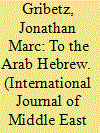|
|
|
Sort Order |
|
|
|
Items / Page
|
|
|
|
|
|
|
| Srl | Item |
| 1 |
ID:
121464


|
|
|
|
|
| Publication |
2013.
|
| Summary/Abstract |
This article studies the origins and functions of a belief in Jewish race in the Arab fin de siècle through a case study of the writings of Shahin Makaryus and al-Muqtaaf, the influential journal he co-edited. The article begins by examining the racial definition of the Jews proffered by Makaryus and al-Muqtaaf. It situates this view, first, within the then-recent controversy surrounding Darwinism and the problem of secularism within the Arab renaissance of the fin de siècle and, second, within the contemporary Egyptian discourse about race concerning Egypt's rule over the Sudan. It then studies the presumed implications of this categorization of the Jews for their supposed racial relatives, the Arabs. It argues that it was precisely the imagined racial link between Jews and Arabs that made race an attractive category for understanding the Jews in the minds of certain Nahda thinkers. Next, it examines Makaryus's approach to Jewish nationalism and Zionism and contends that his apparent sympathy toward the movement may be understood, at least in part, in relation to his racial definition of the Jews. Finally, it concludes with some reflections on the implications of this study for our understanding of secularism in the world of the Nahda.
|
|
|
|
|
|
|
|
|
|
|
|
|
|
|
|
| 2 |
ID:
133307


|
|
|
|
|
| Publication |
2014.
|
| Summary/Abstract |
To the Arab Hebrew [la-?ivriyah ha-?arviyah]! If you are a Hebrew, you are not an Arab. If an Arab, not a Hebrew. So, you are neither a Hebrew nor an Arab . . . C.Q.F.D." This paid announcement, published by an anonymous reader of the Jerusalem-based Hebrew newspaper ha-Tsevi on 27 November 1908, reminds us that the idea of an Arab Jew (or, in the parlance of Palestinian Hebrew in the early 20th century, an Arab Hebrew) has been at once present and contested from the early years of Zionist settlement in Palestine. Moreover, the contestation was (as it remains) often more emotional than logical (ce qu'il fallait démontrer notwithstanding). But the category of Arab Hebrew was not constructed simply to be attacked; for some, including another personal advertiser on the very same page of ha-Tsevi, Arab Hebrew was a self-proclaimed identity. "To M. M.," he or she wrote, "I saw you, I knew you, I respected you. I will leave you, I will remember you, and I will not forget you." This mysterious
|
|
|
|
|
|
|
|
|
|
|
|
|
|
|
|
| 3 |
ID:
145061


|
|
|
|
|
| Summary/Abstract |
In 1970, the Palestine Liberation Organization (PLO) Research Center in Beirut published an Arabic translation of The Zionist Idea, an anthology of classic Zionist texts compiled originally by Arthur Hertzberg in 1959. This article compares how the two versions present the biographies and motivations of key Zionist ideologues. It suggests that, in contrast to Hertzberg, the PLO researchers tended to present Zionism, especially at its roots, as a Jewish religious movement. Attempting to discern what might lie behind this conception of Zionism, the article considers the significance of the religious backgrounds of the leadership of the PLO Research Center and of those involved in the translation project. It argues that the researchers’ concern about the status of Christians as a religious minority among Palestinians and other Arabs and certain deeply rooted Christian ideas about the nature of Judaism may help account for the particular view of Zionism that the Research Center developed in its—and in the PLO's—foundational years.
|
|
|
|
|
|
|
|
|
|
|
|
|
|
|
|
|
|
|
|
|